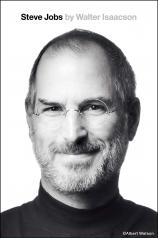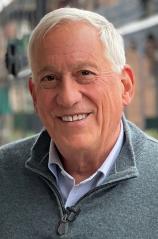Excerpt
Excerpt
Steve Jobs

Excerpt 1
His personality was reflected in the products he created. Just as the core of Apple's philosophy, from the original Macintosh in 1984 to the iPad a generation later, was the end-to-end integration of hardware and software, so too was it the case with Steve Jobs: His passions, perfectionism, demons, desires, artistry, devilry, and obsession for control were integrally connected to his approach to business and the products that resulted.
The unified field theory that ties together Jobs's personality and products begins with his most salient trait: his intensity. His silences could be as searing as his rants; he had taught himself to stare without blinking. Sometimes this intensity was charming, in a geeky way, such as when he was explaining the profundity of Bob Dylan's music or why whatever product he was unveiling at that moment was the most amazing thing that Apple had ever made. At other times it could be terrifying, such as when he was fulminating about Google or Microsoft ripping off Apple.
This intensity encouraged a binary view of the world. Colleagues referred to the hero/shithead dichotomy. You were either one or the other, sometimes on the same day. The same was true of products, ideas, even food: Something was either "the best thing ever," or it was shitty, brain-dead, inedible. As a result, any perceived flaw could set off a rant. The finish on a piece of metal, the curve of the head of a screw, the shade of blue on a box, the intuitiveness of a navigation screen—he would declare them to "completely suck" until that moment when he suddenly pronounced them "absolutely perfect." He thought of himself as an artist, which he was, and he indulged in the temperament of one.
His quest for perfection led to his compulsion for Apple to have end-to-end control of every product that it made. He got hives, or worse, when contemplating great Apple software running on another company's crappy hardware, and he likewise was allergic to the thought of unapproved apps or content polluting the perfection of an Apple device. This ability to integrate hardware and software and content into one unified system enabled him to impose simplicity. The astronomer Johannes Kepler declared that "nature loves simplicity and unity." So did Steve Jobs.
Excerpt 2
For Jobs, belief in an integrated approach was a matter of righteousness. "We do these things not because we are control freaks," he explained. "We do them because we want to make great products, because we care about the user, and because we like to take responsibility for the entire experience rather than turn out the crap that other people make." He also believed he was doing people a service: "They're busy doing whatever they do best, and they want us to do what we do best. Their lives are crowded; they have other things to do than think about how to integrate their computers and devices."
This approach sometimes went against Apple's short-term business interests. But in a world filled with junky devices, inscrutable error messages, and annoying interfaces, it led to astonishing products marked by beguiling user experiences. Using an Apple product could be as sublime as walking in one of the Zen gardens of Kyoto that Jobs loved, and neither experience was created by worshipping at the altar of openness or by letting a thousand flowers bloom. Sometimes it's nice to be in the hands of a control freak.
Jobs's intensity was also evident in his ability to focus. He would set priorities, aim his laser attention on them, and filter out distractions. If something engaged him—the user interface for the original Macintosh, the design of the iPod and iPhone, getting music companies into the iTunes Store—he was relentless. But if he did not want to deal with something—a legal annoyance, a business issue, his cancer diagnosis, a family tug—he would resolutely ignore it. That focus allowed him to say no. He got Apple back on track by cutting all except a few core products. He made devices simpler by eliminating buttons, software simpler by eliminating features, and interfaces simpler by eliminating options.
He attributed his ability to focus and his love of simplicity to his Zen training. It honed his appreciation for intuition, showed him how to filter out anything that was distracting or unnecessary, and nurtured in him an aesthetic based on minimalism.
Unfortunately his Zen training never quite produced in him a Zen-like calm or inner serenity, and that too is part of his legacy. He was often tightly coiled and impatient, traits he made no effort to hide. Most people have a regulator between their mind and mouth that modulates their brutish sentiments and spikiest impulses. Not Jobs. He made a point of being brutally honest. "My job is to say when something sucks rather than sugarcoat it," he said. This made him charismatic and inspiring, yet also, to use the technical term, an asshole at times.
Andy Hertzfeld once told me, "The one question I'd truly love Steve to answer is, 'Why are you sometimes so mean?'" Even his family members wondered whether he simply lacked the filter that restrains people from venting their wounding thoughts or willfully bypassed it. Jobs claimed it was the former. "This is who I am, and you can't expect me to be someone I'm not," he replied when I asked him the question. But I think he actually could have controlled himself, if he had wanted. When he hurt people, it was not because he was lacking in emotional awareness. Quite the contrary: He could size people up, understand their inner thoughts, and know how to relate to them, cajole them, or hurt them at will.
The nasty edge to his personality was not necessary. It hindered him more than it helped him. But it did, at times, serve a purpose. Polite and velvety leaders, who take care to avoid bruising others, are generally not as effective at forcing change. Dozens of the colleagues whom Jobs most abused ended their litany of horror stories by saying that he got them to do things they never dreamed possible.
Excerpt 3
The saga of Steve Jobs is the Silicon Valley creation myth writ large: launching a startup in his parents' garage and building it into the world's most valuable company. He didn't invent many things outright, but he was a master at putting together ideas, art, and technology in ways that invented the future. He designed the Mac after appreciating the power of graphical interfaces in a way that Xerox was unable to do, and he created the iPod after grasping the joy of having a thousand songs in your pocket in a way that Sony, which had all the assets and heritage, never could accomplish. Some leaders push innovations by being good at the big picture. Others do so by mastering details. Jobs did both, relentlessly. As a result he launched a series of products over three decades that transformed whole industries.
Was he smart? No, not exceptionally. Instead, he was a genius. His imaginative leaps were instinctive, unexpected, and at times magical. He was, indeed, an example of what the mathematician Mark Kac called a magician genius, someone whose insights come out of the blue and require intuition more than mere mental processing power. Like a pathfinder, he could absorb information, sniff the winds, and sense what lay ahead.
Steve Jobs thus became the greatest business executive of our era, the one most certain to be remembered a century from now. History will place him in the pantheon right next to Edison and Ford. More than anyone else of his time, he made products that were completely innovative, combining the power of poetry and processors. With a ferocity that could make working with him as unsettling as it was inspiring, he also built the world's most creative company. And he was able to infuse into its DNA the design sensibilities, perfectionism, and imagination that make it likely to be, even decades from now, the company that thrives best at the intersection of artistry and technology.
Excerpt 4
The difference that Jony has made, not only at Apple but in the world, is huge. He is a wickedly intelligent person in all ways. He understands business concepts, marketing concepts. He picks stuff up just like that, click. He understands what we do at our core better than anyone. If I had a spiritual partner at Apple, it's Jony. Jony and I think up most of the products together and then pull others in and say, "Hey, what do you think about this?" He gets the big picture as well as the most infinitesimal details about each product. And he understands that Apple is a product company. He's not just a designer. That's why he works directly for me. He has more operational power than anyone else at Apple except me. There's no one who can tell him what to do, or to butt out. That's the way I set it up.
Excerpt 5
When Jobs gathered his top management for a pep talk just after he became iCEO in September 1997, sitting in the audience was a sensitive and passionate thirty-year-old Brit who was head of the company's design team. Jonathan Ive, known to all as Jony, was planning to quit. He was sick of the company's focus on profit maximization rather than product design. Jobs's talk led him to reconsider. "I remember very clearly Steve announcing that our goal is not just to make money but to make great products," Ive recalled. "The decisions you make based on that philosophy are fundamentally different from the ones we had been making at Apple." Ive and Jobs would soon forge a bond that would lead to the greatest industrial design collaboration of their era.
I've grew up in Chingford, a town on the northeast edge of London. His father was a silversmith who taught at the local college. "He's a fantastic craftsman," Ive recalled. "His Christmas gift to me would be one day of his time in his college workshop, during the Christmas break when no one else was there, helping me make whatever I dreamed up." The only condition was that Jony had to draw by hand what they planned to make. "I always understood the beauty of things made by hand. I came to realize that what was really important was the care that was put into it. What I really despise is when I sense some carelessness in a product."
I've enrolled in Newcastle Polytechnic and spent his spare time and summers working at a design consultancy. One of his creations was a pen with a little ball on top that was fun to fiddle with. It helped give the owner a playful emotional connection to the pen. For his thesis he designed a microphone and earpiece—in purest white plastic—to communicate with hearing-impaired kids. His flat was filled with foam models he had made to help him perfect the design. He also designed an ATM machine and a curved phone, both of which won awards from the Royal Society of Arts. Unlike some designers, he didn't just make beautiful sketches; he also focused on how the engineering and inner components would work. He had an epiphany in college when he was able to design on a Macintosh. "I discovered the Mac and felt I had a connection with the people who were making this product," he recalled. "I suddenly understood what a company was, or was supposed to be."
Steve Jobs
- Genres: Biography, Nonfiction
- paperback: 656 pages
- Publisher: Simon & Schuster
- ISBN-10: 1501127624
- ISBN-13: 9781501127625




